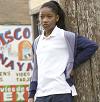 Just how many movies can Hollywood make about spelling bees as a cinematic metaphor for overcoming the odds? It is easy to dismiss the latest film about the importence of speling wordz corectly, “Akeelah and the Bee,”–expanding to nationwide release this weekend–as nothing more than a sentimental copycat of the documentary “Spellbound” or a rip-off the more recent movie, “Bee Season.” But the story of Akeelah Anderson, a fiesty 11-year-old girl from south Los Angeles with a gift for words, has more than enough to inspire–in spite of the movie’s slight feeling of famililarity.
Just how many movies can Hollywood make about spelling bees as a cinematic metaphor for overcoming the odds? It is easy to dismiss the latest film about the importence of speling wordz corectly, “Akeelah and the Bee,”–expanding to nationwide release this weekend–as nothing more than a sentimental copycat of the documentary “Spellbound” or a rip-off the more recent movie, “Bee Season.” But the story of Akeelah Anderson, a fiesty 11-year-old girl from south Los Angeles with a gift for words, has more than enough to inspire–in spite of the movie’s slight feeling of famililarity.
Addicted to Scrabble but afraid to let her peers at school see how smart she is, Akeelah reluctantly enters the school spelling bee with the encouragement and manipulation of her principal. Her single mother Tanya (Angela Bassett) isn’t too thrilled, but along comes the perequisite mentor, which all underdog stories need in the character of no-nonsense Dr. Larabee (Laurence Fishburne). Before you can spell antidisenstablishmentarianism, Akeelah’s love of letters earns her an opportunity to compete for a spot in the Scripps National Spelling Bee. Yes, as these kinds of stories go, “Akeelah” is not just about winning a contest. More importantly, the girl makes new friends, learns some life lessons in courage and determination, and helps her mother begin to heal from the loss of Akeelah’s father.
Humorous and sassy one moment and tender and heartwarming the next, what sets “Akelelah” apart is the way this movie uses academics, not sports, as a uniting force in a poor community where many people have given up on succeeding in life. It’s not an NBA contract that is held up as a symbol of a better life, but the power of knowledge and how to use it correctly.
“Akeelah” also contains something we rarely see on film, a positive portrayal of a young girl of an ethnic minority as the center of a story. The message of “Akeelah” is not only about an underdog beating the odds; Akeelah represents a generation of girls who need a voice and an image that gives them hope for a brighter future. “Akeelah” gently reminds all of us that we are part of the community-at-large that can inspire the next generation of girls (and boys) to hope, dream and achieve through the power of their spirits… and their words.

